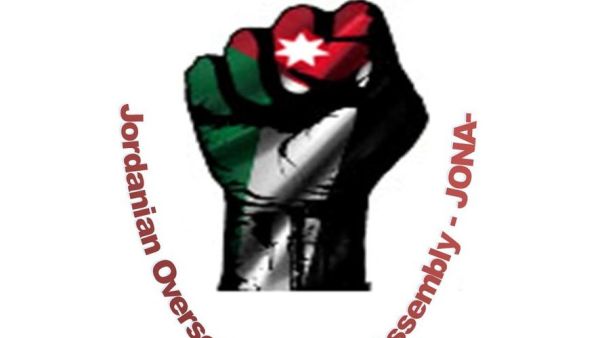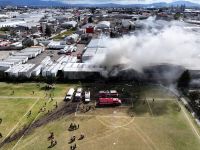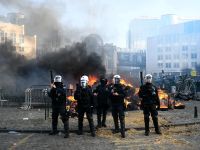There's something rotten outside the Kingdom of Jordan, and it goes by the name JONA.
A tiny pocket of Jordanian activists in opposition to the Hashemite royal rule, may be hatching a plot from abroad. But it is receiving little momentum inside the Kingdom where it counts. Jordanian reformists have discredited and downplayed this Jordanian movement, JONA. Would seeds of discontent sewn abroad carry sway with the Jordanian people?
In recent weeks, a newly-documented pool of Jordanian opposition revolutionaries under the banner JONA, operating from outside the kingdom of Jordan, were heard to be stirring mutiny from abroad. This movement was frowned upon and viewed with immediate suspicion in a country where discord and civil disobedience have little precedence or political merit. As it is, any newcoming collective to the Jordanian political scene would have to fight hard to garner acceptance or to curry popular favor in a predominantly tribally entrenched system.
Cold Shoulder from Jordan-mainland
This nascent grouping of primarily Trans-Jordanians with a couple of Palestinian-Jordanians in the mix call themselves the Jordanian Overseas National Assembly (JONA) and have created a slight stir. Only slight, as they are still under-reported and mostly ignored or dismissed as US-Israeli puppet-strung or ‘foreign’-orchestrated; yet they already come out with a manifesto complete with signatures and a declaration of principles. They have even taken their ‘cause’ to the protest level, waging a small demonstration at the Whitehouse of Washington D.C on January 17th. No more than 25 took part, with conflicting reports on attendees.
Inside, Jordanian opposition groups have censured this fledgling group as a rogue pretender ring, undermined by Israel US association. They have been quick to disassociate from JONA who they refuse to dignify as a popular uprising- tagging them a light-weight, off-shore attempt to rally revolution in an Arab spot where it has so far not caught on.
Jordan’s muted participation in the Arab Spring
The Hashemite Kingdom of Jordan so far this Arab Spring has proved to be a rock-pool of calm in a flammable region that went up in revolutionary smoke, incited by a one-man fire. When all was uncertain in the Levant, North Africa and even parts of the Arabian Gulf, Jordan maintained its cool and relative stability. Organized weekly Friday protests were fooling nobody into believing Jordan might go the full-fledged revolution route. Businesses operating out of the Middle East transferred their regional offices to Amman in 2011 in the hope of not frightening off clients with the looming specter of Arab Uprising threatening client prospects. Those who traditionally summered in Egypt, Syria, or even Lebanon (whose Hariri Tribunal was hotting up) were setting up camp for a palatable, if dry, Jordanian summer. Meanwhile others whose homes were caught in the revolutionary cross-fire in Libya or Bahrain did not hesitate to hop onto those high-season-frequent Royal Jordanian flights. Regular ‘Gulfi’s’ who left their scorching lands for more temperate climes, scrambled over to Jordan as their first picking.
Still, Lebanon didn’t miss a beat of the irony in promoting itself with typically swaggering aplomb and national mock-pride as the most ‘stable’ country in the region. Not all visitors or tourists were quite buying this though- put off by mounting sectarian tensions and scuffles.
Jordan, in spite of any local down-town murmurings otherwise, proved to be just that sanctuary and more as record visitors flocked to join the Jordanian work-abroad returnees. Rumors of the newly Royal British weds honeymooning in South Jordan only added to the sneaking suspicion that the East Bank of the Jordan river was as safe a bet as any traditional lovers' paradise.
Jordan 'til now has been considered fire-proof-- fire-safety approved with a royal seal of ‘non-flammable’ – or complete with a trusty stand-by drill to ward off fire should one arise. Recently, a couple of men independently yet closely apart, burnt in Amman when the trend of self-immolation reached Jordan’s serene waters. Cause for concern was sparked but all too quickly extinguished, as these desperate cases were dismissed as copy-cats flashy suicides. Self-burning, once the preserve of East Asian climates as a form of protest, was born again as a tactic of protest in the Middle East and North Africa when a Tunisian vegetable seller set himself alight in December 2010. Now, as it has become a regular form of Arab Spring anger, some of its initial sway and kudos has worn off as evinced when five plucky Moroccans set themselves on fire to protest unemployment. The power of the inflammatory imagery, it seems, is mitigated when these acts fail to invoke public fury or fail, clumsily, to burn through. Of the five, a couple in serious condition were hospital treated, while the other two escaped with their clothes singed.
Even the fires of suicidal rage failed to really rock this secure and proud Kingdom whose own cool, connected royal family not only savvy with social media with a Tweeting Queen Consort, but also attending and enjoying theater that unapologetically mocked the hopeless plight of Arab leaders beset by revolutions: These leaders claim to understand their people (as per Ben Ali) or to even fight their ‘peoples’s’ revolutionary corner (as per Gaddafi). In December 2011, demand for tickets increased dramatically after HM King Abdullah II attended and reportedly 'much enjoyed' the play, “Now I understand you”.
In the last fortnight especially, however a different story emerged. News of a possible dissident, splinter element, rife with anti-monarchal unrest, at first in whispers, rose to audible albeit underground pitch.
Talk on the Arabian (very down-low) grape-vine had spoken of externally hatched trouble-brewing for Jordan now for nigh on three months. Trouble abroad speared by revolutionary elements, that felt more confident operating from without than within the tightly lip-sealed Kingdom, was becoming a well-known well-kept secret. This grouping of mainly Trans-Jordanians, of Australia, UK, US or Irish dual identity, with a few members of Jordanians of Palestinian extract, has been on the radar in some circles for months inside the Kingdom. They go by the Jordanian Overseas National Assembly( JONA). However this fledgling following has been widely disavowed by all the key Jordanian reformists operating at home internally. These, such as Hiraq il Shabbaby Jordan (commonly known as JO 7irak) or "Jordan’s Youth Movement", have taken pains to disassociate from this external rogue group. In fact, they have further tried to discredit this proto-rebellion by citing aspersions of US Congress links, suggesting conspiratorially that JONA is provoked or sponsored by the US (and worse stil, US-Israel) alliance. A sure-fire way to lose a movement its popularity in the Arab world.
But what of the internally active proclaimed reformists? The "Youth Movement", a product of the Arab Spring, with a healthy Facebook following of over thirteen thousand, keeps its protest anti-government, rather than making its grievances felt to be anti-monarchy. This external lesser profiled incipient movement of anti-monarchists - JONA- has come out from hiding to announce intrepidly its seditious movement, which has more or less called for the downfall of the King and Queen of Jordan. Complete with a manifesto and Face Book page (liked by just 300 feisty cyber rebels) they just this week published a press release-styled declaration of principles, and some You Tube footage highlighting their discontent. Strong strong visual displays included the burning of royal effigies.
Dr. Ahmed Oweidi Al-Abbadi, a controversial Jordanian MP with tribal standing who admits to having dealings with JONA, is nonetheless careful to distance himself from the recent ‘protest’ staged at the White House in D.C. just this week, 17 January, 2012, denying attendance much less a trip to the US. Still, he has made public statements of a provocative nature released via YouTube that attest to his affiliation to a Jordan Republic in the offing within two years. He has been recorded stating his belief that the incumbent ruling King Abdullah II is ‘occupying the country’. He, apparently, shares his attacks among the entire royal clan, not just targeting HM, the King. One of the other signatories to the manifesto, a British Jordanian journalist, Amar Al-Fuqaha’a, was seen in yet a different video-transmitted clip burning the King's portrait in acts of heresy on the streets of London.
In spite of, or because of, their extreme platform, they have accrued a less significant ‘face-value’ following via revolution-friendly platform Face Book. They proclaim intentions to ‘free’ Jordanian people from royal rule, and express anti-monarchy sentiment quite vehemently, accompanied by video-statements released online that level attacks on the royals. In these vocal statements, the King of Jordan and his wife Queen Rania are steeped in allegations of profligacy, accused of squandering the spoils of Jordan on decadent life-styles. To date, the Arab Spring by and large had left the Hashemite royals untouched. At the outset, when Ben Ali fled Tunis on a Friday, by Saturday morning, one observer noted, food prices in the Jordanian capital had decreased by about 5%. One impertinent Tweep (or Twitter poster) soon after advised Queen Rania of Jordan that she should go "palace-hunting in Jeddah" — the coastal Saudi city where Ben Ali took refuge in after fleeing a hostile Tunisia.
Following early murmurings of JONA’s DC protest, a report from Hateen, a Jordanian local news agency broke this week, supplying not only the group’s charter or raw manifesto, but their names and locations. Rebel individuals pledging allegiance to this movement were showing a gall unheard of in a notably loyal nation. Save the odd bread riot flare-up, nipped in the crust before it could spread, Jordan historically has shown little sign of resistance or aggravation towards the ruling Hashemites, and has thus far contained any anti-government noise. Hateen named this explosive declaration of ‘principles’ the most dangerous political statement yet faced by the Kingdom, the first of its kind on file. The signatories of this declaration form an elitist band of university teachers, lawyers, and writers.
Their candid agenda: to usurp the royal family by establishing an Arabic Jordanian Republic.
“We believe in Jordan, not the Hashemite family." They go on to expound that Hashemites derive their legitimacy in Jordan based on being Hejazi and related to the Prophet (PBUH). Jordanians as such are more innate to the land of Jordan. So for them, this regime is considered an ‘occupation’ of the true Jordanian people (however defined).
They allege, contentiously, that the current regime has spent a hundred years trying to quieten the spirit of the people. They criticize the concept of 'good citizens' as primarily loyal to the King, and a traitor being a critic of the king and usually exiled (hence their status abroad). They lay into the freedom of the police to ride roughshod over the people and land, with no accountability. They view the Kingdom as parasitic. They accuse the mutual accord of the Kingdom allied with the new liberal market of draining the country and public money by selling the country to foreign agents, leaving Jordan riddled in a debt of 17 billion dollars.
The Manifest Declaration of Principles for the new Jordanian Republic:
Their skeleton statement is 19 points long. Below a few highlights:
1)Down with the King: The King should go - not before being tried for corruption and made accountable for any crimes.
2) The choice of rule should be in the hands of the people.
They call for a more modern representative unlike the current regime they deride as belonging more to 'the dark ages', whereby they contest that the King is blasphemously above the heavenly law.
3) Under the constitution of the Jordanian Arab Republic:
There should be a rotating government in place which will amongst other things,
- Guide election for a new parliament in four-year cylces.
- Allow a majority to form the cabinet
- Rule by democracy according to the constitution.
4) There is a mission statement or oath:
(Roughly translated) I swear to God to be good to Jordan’s Democratic Republic and to maintain it and respect the law and constitution and safeguard people’s interests and the wellbeing of the country. I vow to preserving the prevailing aims of Jordan people in a nation that remains free and united.
5) The elected government and cabinet will work hard to restore Jordan’s [alleged] stolen outstanding money. All stolen monies to be restored to the State Safe of the country
6) The Republic will be based on justice and equality and freedom
7) The State will respect all religious dominions, as well as mulit parties, and assemblies of expression. There will be no police intervention.
8) Free education and free healthcare.
9) Any changes to the constitution require a public refrendem.
10) Calling for a new anthem, and a new national oath for the country.
11) Also, new image depictions on coins that borrow Jordanian and Islamic symbols across the ages.
12) Th cancellation of street names so-called after royals.
13) Photos of the King and family to be removed from public spaces, stores, restaurants and hotels.
Generally:
“We’re calling for all Jordanians to be part of our peaceful movement in endeavouring to found a Jordanian Arabic Republic"
And a final statement or disclaimer that frees them of the accusation of being under the spell or influence of foreign provocation:
Finally we can guarantee no connection to anybody but to the Jordanian soil and the eternal Jordan river.








